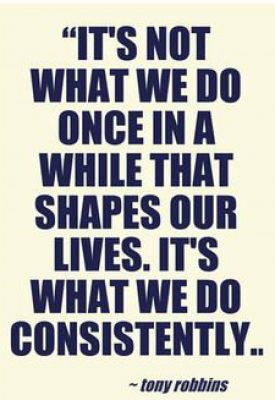This article has a good idea… it suggests consistency as the way of establishing any new habit and making sure it will happen.
Anything worth doing is worth doing every day… day in, day out.
Meditation, spiritual work, being active, reading, learning… as a campaign they are all doomed to fail… but as a daily practice they build the foundation of a spectacular life.
When established, a daily habit becomes second nature. Just like cleaning your teeth in the morning or taking a shower – it would feel wrong to not do it. However with infrequent habits like music practise 3-6 times per week, or exercise twice per week, taking a day off can cause it to be harder to pick it up again afterwards. Then in one fell sweep your positive habit has been ruined completely, and everyday somehow becomes a holiday from it.
Turn a weekly habit into a daily one.
If you sleep in on Sunday morning, you’ll know how hard it can be to get up on Monday morning. The trick is to get up early every day. Even at the weekend. I always get up at 6am; and find it much easier to maintain if I do it every day. You might think that a life without sleeping in is not worth living for and that it’s really hard to do. But 100% consistency is the best way to do it.
With consistency, a habit should stay on autopilot for most of the time without you having to think about it. Part of the stress of getting up is the conflict between the desires to get up early or late. “Hmm, it’s Sunday, don’t I deserve a lie-in? Won’t I perform better with more sleep? I should really get up and write to the Daily Telegraph about the decline in the duck population.” If you stick with a habit every single day, you eliminate self doubt and uncertainty.
Sequence habits together
Rather than tackling several habits in isolation, link them together in a sequence so they become easier to maintain. My morning routine involves getting up, showering, breakfast, piano practise, a bike ride, then getting on the train to my day job. It’s almost as if the positive feelings from completing each task act as the impetus to start another. If I’m feeling a bit overworked, I can always forego one of the tasks, e.g. piano practise, and go straight to the next one. If the first and last links in the sequence remain, then my less musical routine still stays solid. The idea would be to put habits done 3-5 times per week in the middle of the chain so that they remain stable, even though you skip it some days.
Substitute infrequent habits
If you skip habits every so often by using the sequencing method – you can also substitute those infrequent habits with others, so that at least you are doing something constructive and keeping the routine. If you hit the gym 3 times per week, the other 4 days in the week could be filled with a short walk or some reading. Substituting the task with something similar is best, on your off days for exercise, a short walk is better than painting
Read the rest of the article









